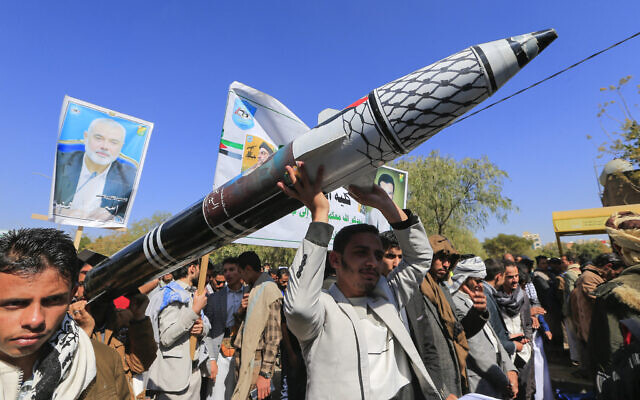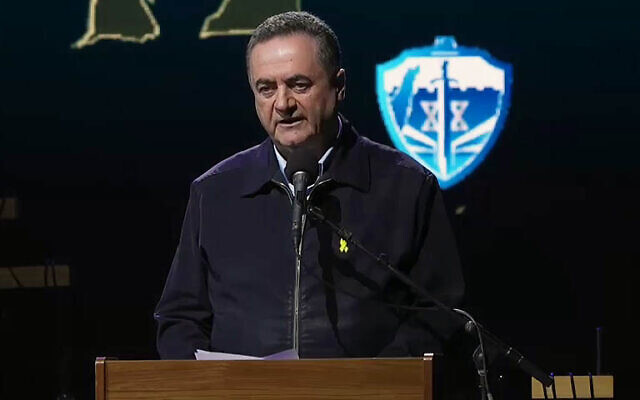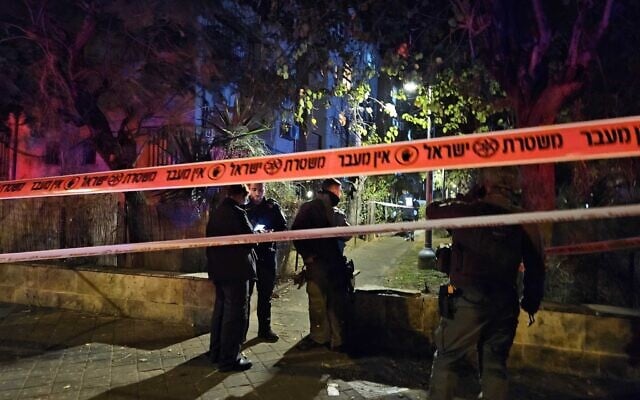



The Iran-backed Houthi rebel group in Yemen launched a drone at Israel on Wednesday, which the Israel Defense Forces said crashed in an open area near the southern city of Ashkelon.
The Houthis quickly took responsibility for the attack, claiming to have launched two drones, one at a “vital and sensitive target” in the Tel Aviv area, and the other at Ashkelon’s industrial zone.
There were no reports of injuries or major damage in the attack as sirens sounded in Ashkelon and some Gaza border communities. There were no reports of impacts in the Tel Aviv area.
The attack came as the Houthis reportedly raised their alert level in anticipation of major Israeli retaliatory strikes after Israeli leaders ramped up threats against the terror group amid a week of near-daily ballistic missile and drone launches targeted central Israel.
The London-based, Saudi-owned Asharq al-Awsat newspaper reported that Houthi leaders have stopped attending regular meetings and are avoiding traditional means of communication out of fear that Israel will strike leadership targets.
According to the report, Houthi officials understand that the intensity of Israeli strikes will increase, and have begun moving assets away from Sana’a and Hodeidah, where Israel has attacked previously.
The Saudi outlet also reported that the precautionary measure have caused a rift within the Iran-backed group’s leadership, with some senior officials feeling like they are out of the loop of decision-making for both internal and external affairs.
The report also said many Houthi officials are in favor of making concessions to “local, regional and international parties to avoid the fate of Hezbollah and the Bashar al-Assad regime.”

According to the report, these officials fear a major Israeli or international campaign could cripple their military and open the door for an escalation in the decade-long civil war between the Houthis and the internationally recognized government of Yemen.
The Hebrew-language Walla new site reported Wednesday that Houthi fighting units received a notification to raise their alert level to the highest degree in recent days, and have begun moving combat forces to the front lines of confrontation with the Yemeni Armed Forces.
In the past 10 days, the Houthis have launched five ballistic missiles and at least five drones at Israel, in what the terror group says is a campaign in support of Gaza amid the ongoing war there against the Hamas terror group.
On Wednesday, Israeli Air Force chief Maj. Gen. Tomer Bar threatened increased strikes on the Houthis in response to the repeated missile and drone attacks on Israel.
“We act forcefully wherever we are required. We have struck the Houthis in Yemen three times. We will continue and increase the pace and intensity of the attacks as much as necessary,” he said during a graduation ceremony for pilots.
On Tuesday, Defense Minister Israel Katz vowed to begin targeting Houthi leaders, saying, “Just as we took care of [Yayha] Sinwar in Gaza, [Ismail] Haniyeh in Tehran and [Hassan] Nasrallah in Beirut, we will deal with the heads of the Houthis in Sana’a or anywhere in Yemen,” referring to the leaders of terror group Hamas and Hezbollah killed by Israel.

Katz’s warning came a day after he threatened to “decapitate” the Houthi leadership in remarks that also confirmed Israel’s hand in killing Haniyeh earlier this year.
In response to the Israeli threats, a senior Houthi official warned Prime Minister Benjamin Netanyahu that his Iran-backed group will not back down from confrontation.
“Netanyahu, do you think you will do to us what you did to Hezbollah? Ask the Yemeni Jews who we are,” said Muhammad Ali al-Houthi, former head of the Houthi Supreme Revolutionary Council, according to Channel 12 news.
Netanyahu warned on Sunday that Israel would act against the Houthis with the same force it used against Iran’s other “terrorist arms.” The premier vowed that even though the operation against the rebel group may take time, the results will be the same as those seen in Israel’s campaign against Hezbollah in Lebanon and Hamas in Gaza.

A ballistic missile fired by Yemen’s Houthis was intercepted by Israeli air defenses early Wednesday morning, marking the second night in a row — and the fourth in less than a week — that the Iran-backed group has fired at Israel’s center in what has recently become a near-nightly occurrence.
On Saturday, attempted interceptions failed to stop a Houthi missile that struck a park in Jaffa, south of Tel Aviv, lightly injuring 16 people in surrounding buildings.
The Houthis have vowed to keep attacking Israel until the end of the war in the Gaza Strip that began on October 7, 2023, when the Palestinian terror group Hamas led a devastating attack on Israel that killed 1,200 people, mostly civilians. Israel is battling to destroy Hamas in Gaza and save the hostages.
The Houthis have launched more than 200 missiles and 170 drones at Israel in the past year. According to the IDF, the vast majority did not reach Israel or were intercepted by the military and Israeli allies in the region.
Israel has carried out airstrikes against Houthi targets three times in response to the group’s attacks, the latest on Thursday.
The Iran-backed group has also carried out repeated missile and drone attacks on some 100 merchant vessels attempting to traverse the Red Sea, forcing many carriers to avoid the key waterway and hamstringing global shipping. The Houthis initially said they were going to attack Israel-linked ships but few of the vessels targeted had ties to Israel.
